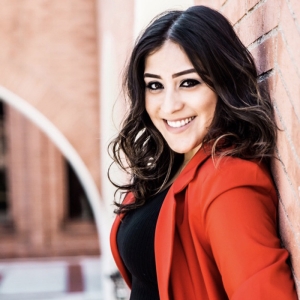Alumna Maria Ruelas Selected as School Social Worker of the Year
December 12, 2018- Alumni
Meet Maria Ruelas, EdD ‘18, MSW ‘13, whose leadership has been instrumental in expanding mental health care and social services within the Lawndale Elementary School District.
Each year, the California Association of School Social Workers (CASSW) recognizes a social worker who has gone above and beyond the call of duty to serve their community. At its annual state conference in Lakewood, California, on Nov. 9, CASSW named Maria Ruelas, EdD ‘18, MSW ‘13, as School Social Worker of the Year.
Maria Ruelas has become a leader in the field of school social work through her work expanding access to mental health care for the Lawndale Elementary School District (LESD). Ruelas spoke with us about her passion for school social work and how the LESD has been able to provide more effective social services to its students thanks in part to a robust internship program staffed by social work students from MSW programs across California.
USC Suzanne Dworak-Peck School of Social Work: How has your position with the Lawndale Elementary School District evolved over the past several years?
Maria Ruelas: Since receiving my MSW from the USC Suzanne Dworak-Peck School of Social Work, I’ve been committed to working with children and school districts. Upon graduation from the MSW program, I was hired by the LESD as a school social worker, which involved visiting schools, identifying social service needs and working one-on-one with students, parents and teachers.
After a year, I was promoted to my current role as the first district-wide social worker, working alongside the director of student support services. In this position, I work to address the mental health and behavioral needs of the students and teachers at the eight schools across our district, implement strategies to reduce suspensions and expulsions, and have helped develop our flourishing internship program.
USC: Has this increased focus on mental health care and social services had a positive impact on students and teachers?
MR: When I began working for the school district in 2013, there were nearly 200 students on a waitlist to receive subsidized mental health care. Since then, we’ve reduced that number to zero by hiring a number of highly qualified school social workers and establishing partnerships with more than 10 community mental health agencies and universities to address the social and emotional needs of our community.
Alongside our efforts to meet the mental health needs of our school community, we’ve taken a more assertive approach to address trauma, implement positive behavioral interventions and supports, promote mindfulness among faculty and staff, and use the Second Step Program to encourage positive social and emotional behaviors and boost average attendance rates in every school.
USC: What kind of impact have these efforts had?
MR: By increasing access to mental health services and focusing on our school climate, we’ve been able to teach mindfulness and foster positive coping skills for both students and teachers. Our results have been amazing: not only have we been able to guarantee mental health services to every member of our community, but we have minimized disciplinary incidents significantly, from 113 suspensions in 2014-2015 to 81 suspensions in the 2015-2016 academic year. We’ve received awards from the state Student Attendance Review Board (SARB) for implementing a model SARB for the purpose of minimizing student dropouts and promoting student success, and have been named Field Agency of the Year by the USC Suzanne Dworak-Peck School of Social Work for our internship program.
USC: How did the decision to launch the LESD internship program come about?
MR: I realized that we were never going to see positive outcomes for students on a large scale if we did not have more social workers on the ground providing direct care. So in 2013, we launched an internship program with six interns who were placed in our school sites to provide individual counseling, group therapy and parenting workshops.
Despite this talented cohort of social work students and a community-based approach, there remained a need for additional mental health services. In the hopes of addressing this gap and providing school social work training for more MSW students, I partnered with the USC Suzanne Dworak-Peck School of Social Work to establish the LESD as a teaching institution.
At the same time, I petitioned the director of the LESD to hire one social worker at every school site in the district, not just to provide students and teachers with increased access to social services, but also to train and oversee interns every year. As a result, we’ve been able to grow the program from just six interns in 2013 to 72 interns last year!
USC: What skills do LESD interns learn as school social workers?
MR: Through this initiative, we’ve been able to provide our interns with valuable clinical training and sophisticated data-driven and evidence-based frameworks for promoting students’ and teachers’ mental health, enhancing school safety and minimizing disciplinary incidents. These students leave the internship as skilled practitioners ready to address crisis situations in a culturally competent manner.
USC: What advice would you offer to current MSW students preparing to embark on a career in social work?
MR: I would encourage every social work student to nurture their existing academic and professional relationships. Oftentimes I’ve found that good connections have provided me with the resources I needed to achieve my professional goals.
I would also emphasize that while it’s easy to get caught up in the pressure of securing a job, that’s not the important part. Cherish the education that you’ve been afforded and trust the process. If you have worked hard to develop your skill set and foundational knowledge, the rest will follow.
To reference the work of our faculty online, we ask that you directly quote their work where possible and attribute it to "FACULTY NAME, a professor in the USC Suzanne Dworak-Peck School of Social Work” (LINK: https://dworakpeck.usc.edu)
